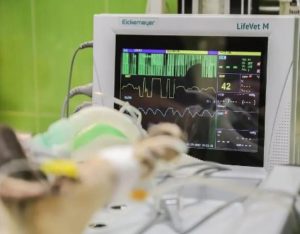
Representational image (Photo credit: Pixabay)
Cardiovascular disease (CVD) is known to be the leading global cause of death due to non-communicable diseases . It accounts for more than 17.9 million deaths per year, globally.
Of these deaths, 85 per cent were due to heart attack and stroke. Even in India, around 35,40,000 deaths occur due to cardiovascular disease (CVD), according to the report released by the World Health Organization. This may be attributed to an underlying genetic predisposition to metabolic deregulation and cardiomyopathy, as well as a recent shift towards increasing consumption of red meats, saturated fats, trans fats, junk foods, and a sedentary lifestyle.
Usually, individuals at risk of CVD may demonstrate high blood pressure, glucose, and lipids. Also, they tend to be overweight and obese. However, identifying those at the highest risk of CVDs and ensuring they get regularly screened and receive appropriate treatment can prevent premature deaths.
Also, early detection further reduces and prevents complications such as heart failure, stroke, and kidney disease through early treatment. For instance, calcium scoring is one such screening test that helps to predict the risk of a heart attack in the future. Basically, calcium build-up or plaque, made up of fatty substances or LDL cholesterol, may become inflamed and rupture, forming a blood clot that can cause a heart attack.
Through the test, the amount of calcium in the coronary artery is determined via specialized CT imaging – confirming the total area being occupied and the density. Thus, the test is effective in pre-determining the risk of heart attacks.
Other such tests that can predict heart diseases include CT Coronary Angiography, Exercise Treadmill Test, Resting Electrocardiogram (ECG), Cardiac stress imaging (stress echocardiography), etc.
Biomarkers For Heart Disease
Heart diseases are devastating for an individual, therefore, these should be and can easily be averted through biomarkers that predict heart disease. Traditionally, cardiologists used to check patients based on certain standard risk factors, such as high blood pressure, high cholesterol, and a family history of CVD. But for a more comprehensive assessment of cardiovascular health, there are some biomarker tests available these days which help to screen patients and thus help doctors in creating certain prevention strategies for patients.
a) High-sensitivity C-reactive protein (Hs-CRP)
C-Reactive Protein (CRP) is a protein produced by the liver as part of our body’s response to injury or infection. Basically, CRP indicates inflammation in some parts of the body. Inflammation causes atherosclerosis, in which fatty deposits block our arteries. But, measuring CRP alone does not predict the risk of heart disease. Its combination of hs-CRP test results with other blood test results and risk factors for heart disease helps to create an overall picture of heart health.
Generally, people who are otherwise healthy and have normal or low cholesterol levels but have high CRP levels are more likely to develop heart disease and its complications, such as heart attacks, strokes, sudden cardiac death, etc. In fact, people with high CRP have 2 or 3 times the risk of developing heart disease and strokes compared to people with low CRP levels.
CRP testing helps to identify such people who are susceptible of having heart disease or stroke and thus reduce their risk of heart/brain attack.
b) Homocysteine
Even a mild increase in the levels of homocysteine (Hcy) is considered a risk factor for several diseases such as cardiovascular disease, stroke, neurodegenerative disorders like dementia and Alzheimer’s disease, etc.
Homocysteine has been evaluated as a potential indicator of cardiovascular and cerebrovascular disease thereby reducing the risk of heart disease and stroke. These blood marker tests help medical professionals to identify hidden risks for a heart attack or stroke in seemingly healthy patients; before symptoms strike.
Who should go for screening for cardiovascular risk factors?
An adult aged 18 years and above should go for screening for cardiovascular risk factors, especially if they have a family history of CVDs. Individuals with diabetes, high blood pressure, and long-standing kidney disease have a higher risk for cardiovascular disease and therefore, should be screened regularly based on their doctor’s advice. As with most health ailments, prevention is better than cure.




 Driving Naari Programme launched in Chandigarh
Driving Naari Programme launched in Chandigarh






























